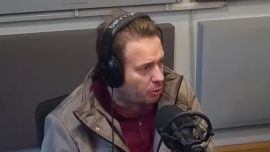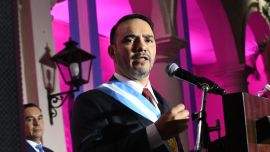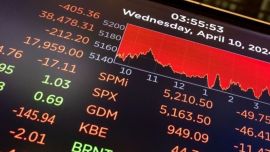The intense interest in La Scaloneta’s defence of its Copa América championship tomorrow evokes that timeless definition of Argentines as being xx million coaches of the national football squad (xx being whatever the population might have been at the time in the last few generations) – that definition mostly surfaces around key moments like tomorrow but has been rather more continuously extended to describe this country also as xx million economy ministers.
Even limiting the number to those formally designated to head that portfolio, the ministry helm has changed hands 130 times since its creation in 1854 (which is not synonymous with 130 different ministers because several have had two bites of the cherry, such as Domingo Cavallo, Roberto Alemann, José Alfredo Martínez de Hoz and Juan Carlos Pugliese in living memory) – an average life of 15 months for each minister although ranging from three days for Jorge Santamarina in 1943 to six years or more for Cavallo and the first Peronist minister Ramón Cereijo.
Yet the atomisation of economic thinking prevails far beyond the ministerial level. There is any number of theories such as the orthodox, the monetarists, supply-side economics, Keynesianism, socialism protectionism, structuralism, etc. etc. and now far more recently, of course, the Austrian school and anarcho-capitalism. But the main aim of this column (drawing from various news items in the last few days, weeks and months) is to point out that quite apart from all the doctrinal differences, even when economists agree in theory, they do not in practice – a country of 46 million economists as well as ministers.
The most recent cases in point have been the creation of a Deregulation & State Transformation Ministry for Federico Sturzenegger, the resignation of Fausto Spotorno as an economic advisor and the midweek ouster of Fernando Villela from the Bioeconomy Secretariat supervising agribusiness (renamed in the process).
Starting with the latter, the new Agriculture, Cattle-Breeding & Fisheries (ex-Bioeconomy) Secretary Sergio Iraeta lists his objectives as “reducing the bureaucratic structure of the state, boosting the capacities of agricultural producers, generating the conditions to increase competitiveness and to continue opening up new markets for the heterogeneous national agricultural production.” But quite apart from the first of these objectives being presumably Sturzenegger’s brief, how do these aims differ in any way from Villela’s priorities? The concrete differences would seem to lie in their political patronage – while Villela was linked to former Cabinet chief Nicolás Posse whose protégés have been purged on a wide front since his ouster in late May, Iraeta is close to Economy Minister Luis Caputo.
In the first half of this year the latter has often given the impression that he is the real hands-on, day-to-day boss running things rather than a globetrotting President more inclined to verbal pyrotechnics than economic brass tacks when at home, thus banishing the initial speculation that Caputo was another Jorge Remes Lenicov (the first minister after the 2001-2002 meltdown lasting just three months) doing the dirty work to turn around the economic tide before stepping aside in favour of a deep reformer often tipped as Sturzenegger – now the former Central Bank governor’s rise to parallel ministerial status revives that speculation.
Caputo begins to be seen again as the stopgap to install a fiscal surplus and bring down inflation with short-term moves ahead of the structural reforms for which his background as a financial trader does not equip him – that background initially offered the additional attraction of bringing in overseas funds but that has failed to happen. Sturzenegger disavows seeking revenge for Caputo replacing him at the Central Bank helm in mid-2018 but his often tautological list of 27 objectives includes “the revision of tax schemes and exemptions and special regimes which generate privileges or distortions in the functioning of markets and the economy” – a frontal attack against another Caputo (Nicolás), one of the two main beneficiaries of the Tierra del Fuego industrial promotion regime whose assembly plants protected via tax breaks excessively elevate the cost of Argentine electronics in flagrant contradiction with any free market creed.
Whether or not Caputo reaches that historical average stint of 15 months would thus seem to hang in the balance. Paradoxically enough, success would seem to conspire against his chances of survival – if structural reforms and the normalisation of the economy must necessarily await the end of the ‘cepo’ currency and capital controls, Caputo postpones his own demise by delaying the latter (by the same token one might say that Sturzenegger’s new ministry has a built-in extinction if he actually succeeds in his ambitious deregulation).
Ending the cepo would seem to be the sore point for the resigning advisor Spotorno – the classic case of an economist in total agreement with the government’s economic philosophy and yet disagreeing. President Javier Milei has laid down a series of inflexible conditions prior to exit from capital controls, including ending the quasi-fiscal as well as the fiscal deficit, Central Bank reserves strongly in the black and convergence between inflation and the rigid crawling peg devaluation of a monthly two percent. Spotorno argues that if you are going to await the convergence of ideal conditions, you can wait forever – the Mauricio Macri administration lifted the cepo in its first week after inheriting rifled Central Bank coffers from the Kirchnerite years without adverse consequences for almost 30 months and with the subsequent dire straits having other domestic and international causes.
This weekend Argentina will be a country of 46 million football coaches but thereafter the economists will return and be millions in the phrase of Eva Perón.























Comments